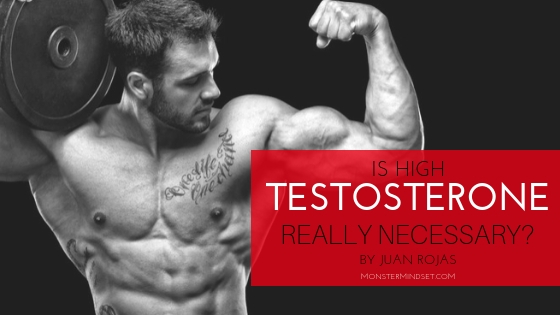
You're taking your protein, you even pre-package vitamins and you're working hard at the gym. You’re there longer than others and try everything in your power to progress, yet you still don't seem to put on as much muscle as your other buddies. Many will find they must work a little bit harder than the average person to lose fat and gain muscle. Oftentimes, even with proper training and nutrition, you might find that naturally you are a little bit softer and retain more water than everybody else. Does this sound like a problem you have ever faced? Well if you haven’t, that’s great; but if you have you might want to give this a read. Many times, individuals have a problem putting on muscle despite their best efforts in the gym, and this can be caused due to hormone imbalances.
One of the most important hormones for building muscle is testosterone. In a perfect world, we would have the perfect amount of testosterone to build as much muscle as possible. But realistically, everybody is different and many will have trouble naturally producing this hormone. Not having proper levels of testosterone can be very detrimental. Many studies show that having lower levels of testosterone can affect males by suffering from depression, erectile dysfunction, less energy, decreased muscle mass and a lower sex drive. Although females need much less testosterone than males, how does a lack of it affect females? They can suffer from many of the same symptoms like fatigue, difficulty losing weight, mood swings, and even hair loss.
Although all these symptoms should be of concern, as athletes, one of the main concerns would be putting on as much muscle and being able to carry the least amount of fat as possible. And this is where maximizing our natural levels of testosterone comes as something no OPA athlete should dismiss.
Testosterone 101
Testosterone is a steroid hormone that is produced by the Leydig cells in the testes of males or in four various locations in females. In order to create high testosterone, your body produces it from cholesterol, which is a fatty acid we consume in our diet. Throughout the day, our brain sends out signals to the pituitary gland to release certain hormones, which are the precursors to testosterone. Our bodies will usually be able to self-regulate and produce the right amount of testosterone needed. But for many individuals, this isn’t the case. Now, why is it of importance to us as athlete’s to know this if our bodies naturally do it?
Why should I care about Testosterone?
As we have discussed before, there are many advantages to having normal to high ranges of testosterone in our everyday life. But as athletes, and most importantly physique athletes, testosterone is directly related to increased muscle mass and improved athletic performance. Testosterone increases muscle mass by skyrocketing the rate of protein synthesis in the body (another complex topic for another day, but increased protein synthesis is something that is crucial for gaining muscle), allowing you to maximize hypertrophy. To make protein synthesis short, it is the method by which muscles are built. The human body uses protein and absorbs it in order to grow, so we want this process to elicit the highest degree possible of absorption. How can we ensure ourselves that we have high testosterone production?
Increasing Testosterone Naturally
Doing everything possible in your hands to increase testosterone naturally can be the difference between you living out your greatest life and being depressed. When your testosterone naturally increases you don't have to worry about adverse health effects caused by taking synthetic hormones. Here are some ways you can increase your testosterone levels naturally:
Getting Enough Sleep. This is fundamental to having higher testosterone levels and proper recovery. The greatest amount of growth hormone is also released at this time and most of your muscle growth occurs while you sleep. In a study done in 2001 by the Journal of Clinical Endocrinology & Metabolism, 10 healthy 20-year-olds were examined with how their testosterone levels reacted to their sleeping patterns. First, they got fragmented sleep, which they were accustomed to, and no testosterone increases occurred. These same individuals, when examined with normal sleep patterns, were reported to have had increases of 20%-30% more in their testosterone. From this, we can conclude, that you should be sleeping at least 7-8 hours a night.
Weightlifting. Studies have shown that when your body is pushing heavy weights in the gym, it releases higher levels of testosterone, especially with exercises that use a large number of muscles at once, such as squats and deadlifts.
Lower alcohol consumption. Alcohol does not only lead to zinc depletion but in a study conducted by Dr. A. Sierksma, it was shown that people who drank 2-3 beers per day lowered their testosterone levels by 6.8% in a three week period. Not to mention, alcohol in excess also lowers protein synthesis, which is crucial for muscle hypertrophy.
Taking in enough zinc. In a study of 88 men aged 40 to 60, it showed that those with normal testosterone levels had a much higher amount of zinc in them than those with low testosterone levels. Zinc was directly correlated with testosterone levels.
Proper diet. Your diet is key to having higher levels of testosterone; make sure you are eating things with moderate amounts of natural animal fats like meats and eggs. These contain specific fats and cholesterol which are crucial for making testosterone. Healthy fats, like seeds, nuts, and avocados, have a very positive effect on your testosterone levels as well.
Lower your stress levels. When you're under high levels of stress, your body releases a hormone called cortisol, and this hormone lowers the effects of testosterone on the body and can hinder your progress.
Supplementing with testosterone boosters. This is not a must, but to boost your natural testosterone levels you can supplement with many herbs and products that are sold over the counter. Testosterone boosting blends are made by many companies, but if you notice, they all use similar products in order to boost your testosterone. These items may include, D-aspartic acid, Tribulus, fenugreek, mucuna pruriens, ZMA and many more.
Conclusion
As we have discussed, there is a very complex process that occurs when testosterone is made by the body and this will have a great impact on our body composition. Testosterone is the most important hormone in the process of building muscle, although there are many other hormones that play key roles as well. So make sure that you are maximizing your hormone production by following the recommendations in this article. The Monster Mindset and testosterone work hand in hand in order to have you operating at a higher state of consciousness. They complement each other and you must maximize both of them in order to live the life of success you want!
References
http://www.bodybuilding.com/fun/vm12.htm
http://www.medicinecoach.com/testosterone-basics/
http://www.harvardprostateknowledge.org/a-harvard-expert-shares-his-thoughts-on-testosterone-replacement-therapy
http://www.seekwellness.com/andropause/testosterone.htm
http://www.peaktestosterone.com/Testosterone_Levels_Male.aspx
http://www.peaktestosterone.com/Testosterone_Lower.aspx
http://www.peaktestosterone.com/How-To-Increase-Testosterone-Naturally.aspx
http://www.ehow.com/about_5173145_testosterone-muscle-growth_.html
http://www.timinvermont.com/fitness/test1.htm
http://www.faqs.org/sports-science/Mo-Pl/Muscle-Protein-Synthesis.html
http://tctmed.com/7-symptoms-of-low-testosterone-in-women/
http://www.peaktestosterone.com/How-To-Increase-Testosterone-Naturally.aspx
http://fitness.mercola.com/sites/fitness/archive/2012/07/27/increase-testosterone-levels.aspx
http://www.charlespoliquin.com/ArticlesMultimedia/Articles/Article/934/Five_Simple_Ways_to_Raise_Testosterone_Levels_for_.aspx
Journal of Clin Endo & Metab 86(3):1134f, 2001
Sierksma A, et al. Effect of moderate alcohol consumption on plasma dehydroepiandrosterone sulfate, testosterone, and estradiol levels in middle-aged men and postmenopausal women: a diet-controlled intervention study. Alcohol Clin Exp Res. 2004 May;28(5):780-5.
http://www.charlespoliquin.com/ArticlesMultimedia/Articles/Article/812/Top_Ten_Benefits_of_Zinc.aspx



